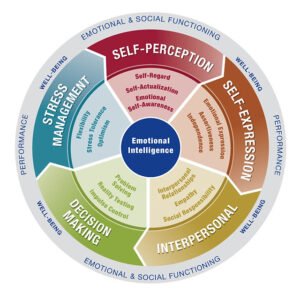Emotional Intelligence: The Key to Understanding and Nurturing Interpersonal Connections

Emotional intelligence, often abbreviated as EQ (Emotional Quotient), is a fundamental aspect of human behavior and interpersonal relationships. Unlike traditional intelligence (IQ), which primarily measures cognitive abilities and problem-solving skills, emotional intelligence focuses on understanding and managing emotions in oneself and others. It plays a crucial role in how we navigate through life, impacting our social interactions, personal well-being, and overall success.
The Components of Emotional Intelligence:
- Self-Awareness: This is the foundation of emotional intelligence. Self-awareness involves recognizing and understanding our emotions, thoughts, strengths, weaknesses, and how they influence our behavior. People with high self-awareness can assess their feelings without being overwhelmed by them, leading to better decision-making and healthier coping mechanisms.
- Self-Regulation: Once we become aware of our emotions, the next step is managing them effectively. Self-regulation is about controlling impulsive reactions and maintaining emotional balance. Individuals with strong self-regulation can handle stress, remain composed under pressure, and exhibit a calm demeanor in challenging situations.
- Empathy: Empathy is the ability to understand and share the emotions of others. It allows us to connect deeply with people by acknowledging their feelings and perspectives. Empathetic individuals are better equipped to offer support, build meaningful relationships, and resolve conflicts with compassion and understanding.
- Social Skills: Effective communication, teamwork, and the ability to build rapport with others fall under social skills. People with high emotional intelligence excel in networking, collaboration, and conflict resolution, as they can navigate social dynamics with finesse.
- Motivation: Emotional intelligence also encompasses the drive and perseverance to achieve personal and professional goals. Motivated individuals are resilient in the face of challenges, maintain a positive outlook, and are better equipped to overcome obstacles.
The Importance of Emotional Intelligence:
- Enhanced Relationships: Emotional intelligence fosters stronger and more fulfilling relationships. By understanding and empathizing with others, we can establish trust, create a supportive environment, and forge lasting bonds.
- Conflict Resolution: In personal and professional settings, conflicts are inevitable. Emotional intelligence enables us to handle conflicts constructively, promoting open dialogue and cooperation rather than escalating disputes.
- Leadership Skills: Successful leaders often possess high emotional intelligence. They inspire and motivate their teams, effectively communicate their vision, and make decisions that consider the emotional impact on others.
- Improved Mental Health: Emotional intelligence is closely linked to mental well-being. People who can manage their emotions are less likely to experience anxiety, depression, or other emotional disorders.
- Success in the Workplace: EQ is increasingly recognized as a critical factor for career success. It influences job performance, teamwork, adaptability, and the ability to lead effectively.
Developing Emotional Intelligence:
Fortunately, emotional intelligence is not fixed at birth and can be developed and enhanced throughout life. Here are some strategies to cultivate emotional intelligence:
- Practice self-reflection: Take time to identify and understand your emotions, triggers, and thought patterns.
- Active listening: Listen attentively to others and try to grasp their emotions and perspectives.
- Empathize with others: Put yourself in someone else’s shoes to understand their feelings and experiences better.
- Manage stress: Adopt healthy coping mechanisms like exercise, meditation, or spending time in nature to manage stress effectively.
- Seek feedback: Be open to feedback from others, as it can provide valuable insights into your emotional strengths and weaknesses.
Emotional intelligence is a vital skill that enhances our personal and professional lives. By honing our self-awareness, empathy, and social skills, we can create a more harmonious and understanding world, nurturing meaningful connections with others and ourselves.

Comments